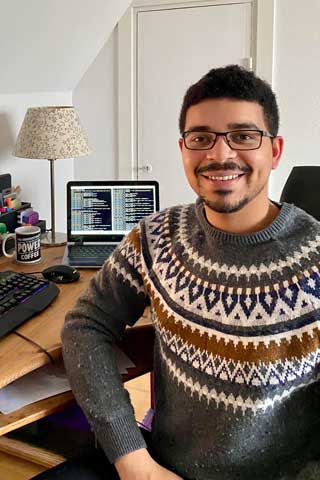Jonathan Josephs-Spaulding ‘16
Bachelor’s degrees in biology and environmental studies
Doctoral candidate at the University of Kiel, Germany

Soon-to-be Doctor of Natural Science Jonathan Josephs-Spaulding ’16 is wrapping up his doctoral dissertation at the University of Kiel in Germany. His research builds on what he began at Pitt-Bradford studying with professors in the biology and environmental studies programs.
Since graduating in 2016, Josephs-Spaulding has focused on a blend of his interests, exploring how the environment affects human immune systems and microbiomes, which are all of the microbes living in a given habitat.
Josephs-Spaulding has chosen to pursue his research using a relatively new tool in the researchers’ arsenal – computational modeling. With the advent of gene sequencing, scientists can now make computer models of microbiomes and predict how they will respond to various environments or treatments without having to expose actual patients to potential harm or inconvenience.
During the pandemic, the team he works with was able to create models of different immune cells and simulate how they interact with COVID-19, for example, what causes the virus to replicate more slowly. Critically, it was all research that scientists could conduct safely from home. All they needed were computers.
He attributes the root of his interest and supercomputing to a summer project he did at Pitt-Bradford with Dr. Denise Piechnik, associate professor of biology, working with tiny independent computers called Arduinos to study insect ecology.
“That Arduino work with Dr. Piechnik really gave me a springboard to getting into the computer modeling I do today,” he said. “There is no difference in studying environmental effects with humans. I would not have done this without doing that summer program at Pitt-Bradford.
“I think I had a really good environment at Pitt-Bradford. There were professors who really looked out for me and encouraged me to explore new topics. They all cultivated a different aspect of me. When people ask me about American liberal arts, I’m super proud of that.”
Josephs-Spaulding also values a broad perspective. Following his graduation from Pitt-Bradford, he earned a Master of Health Science in environmental health sciences at the Johns Hopkins Bloomberg School of Public Health. But he also backpacked and explored Asia, teaching English and meeting new friends from around the world, including many Germans, who always seemed up for an adventure.
Having grown up in a multilingual home in south Florida, Josephs-Spaulding admits he has an affinity for languages, and has picked up bits of Spanish, Vietnamese, Chinese and German. When it came time to find a doctoral program, he kept his options open.
“I wanted to pursue microbiology, and Germany has one of the oldest histories in microbiology,” he said. When the finishing touches on his doctoral thesis are done, he has a 30,000-euro grant (about $34,000 in U.S. currency) to study a chemical found in packaging that leeches into the environment that will mix three of his interests – the environment, human medicine and computers.
There were professors who really looked out for me and encouraged me to explore new topics. They all cultivated a different aspect of me.Jonathan Josephs-Spaulding ‘16